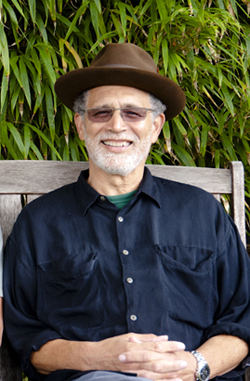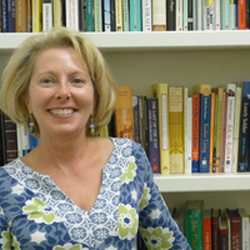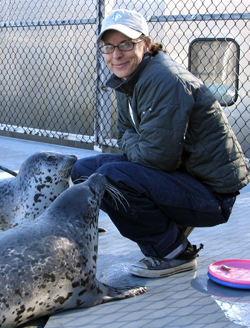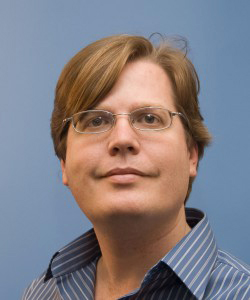UC Santa Cruz’s Institute of the Arts and Sciences will present its first “LASER” talk of 2015 on Tuesday, February 10, at the Digital Arts Research Center.
The Leonardo Art/Science Evening Rendezvous (LASER) is a national program of evening gatherings that bring artists, scientists, and scholars together for informal presentations and conversations.
The goal of the series is to feature compelling new developments in the arts and sciences, and to attract audiences that would not normally be found at the same gathering.
The February 10 event will include presentations by four UC Santa Cruz faculty—Lewis Watts ("Black Presence in France—‘Paris Noir’),” Noah Wardrip-Fruin (“Expanding Fiction's Possibilities"), Deanna Shemek (“Fast-Forward Renaissance: the Science of Preserving Cultural Heritage”), and Colleen Reichmuth ("Exploring the Inner Worlds of Marine Mammals").
Lewis Watts is an emeritus professor of art at UC Santa Cruz. A photographer, curator, and archivist, he examines the cultural landscape of African American communities.
“My talk will be on a project I'm doing about my photographic investigation of the Black Presence in France (Paris Noir),” said Watts. “I went to Paris for the first time in over 40 years in 2013 to present work from my book with Eric Porter, New Orleans Suite, at the University of Anger/Nanes and at a Black Arts Conference in Paris.”
“I was drawn to begin photographing the large critical mass of people of African descent that I saw and to make comparisons to the U.S., as well as to record the many references to African American culture that I saw all over town,” he added. “I'll be presenting images from this work-in-progress.”
Watts is also the author of Harlem of the West: The San Francisco Fillmore Jazz Era (2006), and his work has appeared in numerous exhibitions and publications.
Noah Wardrip-Fruin is an associate professor of computer science at UC Santa Cruz and co-director of the Expressive Intelligence Studio, one of the world's largest technical research groups focused on games. He also directs the Playable Media group in UCSC's Digital Arts and New Media program.
“I'm planning to discuss a series of projects that use computational media to explore the possibilities for new types of fiction,” said Wardrip-Fruin. “These will range from a project that uses an immersive, room-size virtual reality display to create texts that flock around the reader's body (‘Screen’), to a project that uses a new artificial intelligence approach to social modeling to create an interactive story about high school stereotypes that builds on and challenges our preconceptions (‘Prom Week’).”
"Storytelling is one of the key ways that we understand ourselves and the world,” he added. “New forms of computational media are providing powerful new possibilities for storytelling, including ones that deeply respond to the audience. At UC Santa Cruz we are world leaders in combining arts and technology research to invent the storytelling media of the future."
Deanna Shemek is a professor of literature at UC Santa Cruz. Her research and teaching centers on Renaissance studies and focuses on the crossroads between literary, historical, art historical, and political materials. Shemek has recently embarked on a digital humanities project aimed at preservation and creative study of the European Renaissance.
“This project marries the most traditional of scholarly pursuits—the editing of handwritten manuscripts—with sensibilities and technologies that mark contemporary humanities research,” said Shemek. “The focus of my endeavor is on the correspondence, collecting, and music identified with one of the most prominent female figures of the Italian Renaissance, Isabella d’Este, marchioness of Mantua. Over the years of her adult life, Isabella produced over 28,000 letters covering a wide range of topics: the art collecting that made her famous, but also government, politics, fashion, family life, food, animals, and much more.”
“My team includes specialists in literary, visual, and music studies along with Web programmers and developers in the U.S., Italy, Australia, and Scotland,” Shemek added. “Our aim is to build a multi-dimensional, online environment that will allow collaboration among scholars working in the virtual archive, and to integrate this archive with an interactive, 3D recreation of her celebrated art space.”
Colleen Reichmuth heads the Pinniped Cognition and Sensory Systems Laboratory, based at UC Santa Cruz's Long Marine Lab, where resident seals, sea lions and sea otters are trained for participation in studies about how these amphibious marine mammals acquire and process information.
Trained primarily as an animal behaviorist, she conducts research in the areas of comparative cognition, bioacoustics, and behavioral ecology. Reichmuth has extensive experience with laboratory and field methods addressing how animals produce, perceive, and are affected by sound, as well as expertise in operant studies of discrimination learning and emergent behavior. She also mentors graduate and undergraduate students conducting research in the areas of animal learning and sensory biology.
The presentations begin at 7 p.m. in the Digital Arts Research Center building (DARC--Room 108). Admission is free and open to the public.
For more information, contact the Institute of the Arts and Sciences at ias@ucsc.edu.
The Institute of the Arts and Sciences is one of the priority initiatives of UC Santa Cruz’s comprehensive fundraising campaign.
The Campaign for UC Santa Cruz supports excellence across the university through increased private investment in the people and ideas shaping the future. It is bringing critical new resources to each academic division, and to signature initiatives in the Student Experience, Genomics and Health, Coastal Sustainability, the Institute of the Arts and Sciences, and Data Science Leadership.






